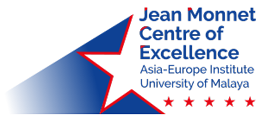
Asia-Europe Institute (AEI) hosted the Comparative Regionalism Workshop 2018 as part of its activities as a Jean Monnet Centre of Excellence on April 6 and 7, 2018. The workshop was titled Bridging Regional Knowledge and was conducted by invited lecturer, Dr Paul Gillespie. Dr Gillespie is the Deputy Director at the Institute of British-Irish Studies, and a Senior Research Fellow adjunct in the School of Politics and International Relations, University of College Dublin.
He was formerly the foreign policy editor at The Irish Times and remains a columnist and writer for the paper since his retirement as editor in 2009. He has written and published extensively on issues of European integration and political identities, comparative regionalism, Irish-British relations, Europe-Asia relations, media and foreign policy, and the EuroMed region. Some of his more recent publications include the chapter ‘Crises as drivers of integration in Europe and Asia: crisis as threat’ in Drivers of Integration and Regionalism in Europe and Asia and his co-edited volume with Daithi O’Ceallaigh, Britain and Europe: The Endgame, An Irish Perspective.
This workshop was conducted in light of the growing academic discourse exploring various political, economic and social facets associated with deepening global ties and the formation of regional institutions such as the European Union (EU) and the Association of Southeast Asian Nations (ASEAN). These regional bodies play an increasingly important role not only in coordinating the governance and cooperation amongst member nations but also to represent the collective interest of member nations within the international community. As the global community experience an intensification of regionalization through ever-increasing economic ties and advancement in information communication technology, regional bodies have also faced various challenges that they need to adapt to – from Brexit to the expansion of mandate and membership.
Thus comparative studies on regionalism play an ever-growing importance. As a Jean Monnet Centre of Excellence, AEI aims to help foster and encourage the growth of ASEAN-EU studies and this workshop was aimed at fostering academic thinking in the field of comparative regionalism. The two-day workshop was attended by undergraduate to PhD level students from various disciplinary backgrounds and provided students with both a theoretical and practical exploration of conducting studies on comparative regionalism. On the first day of the workshop (April 6), Dr Gillespie lectured on the basis of regionalism in the world, exploring the growing scholarship and research areas available and building a deeper understanding of the trends within the study of regionalism.
The second day of the workshop provided the participants with an opportunity to work in groups and brainstorm research ideas. Dr Gillespie started the day’s activities by sharing some examples of academic publication on comparative regionalism in order to provide the students with examples of research currently available. The students then worked in groups of three to five people to prepare their own research proposal. After lunch, the three groups presented their own proposed research projects to a panel consisting of Dr Paul Gillespie as chair, Associate Professor Dr Aida Idris, Dr Rahul Mishra, Dr Fumitaka Furuoka and Dr Nurliana Kamaruddin, for comments and critique. The three topics presented by the groups were Formation of identity awareness: a comparative on ASEAN and EU; Environmental policies of SAARC and member states: Gaps in implementation and ASEAN policies evolution: from founding to new members. The day concluded with a certificate award ceremony for all the participants and a token of appreciation from AEI to Dr Paul Gillespie.
- Prepared by Dr. Nurliana Kamaruddin
Last Update: 15/12/2021